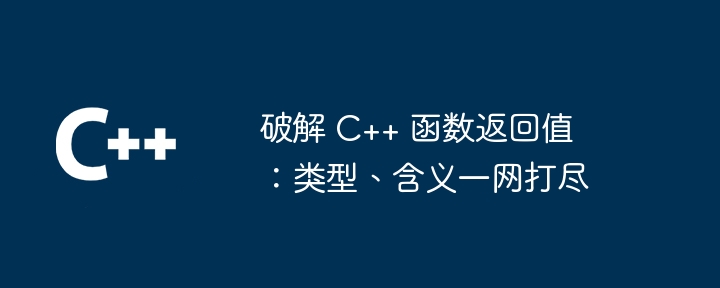Home >Backend Development >C++ >Cracking C++ function return values: types and meanings all at once
Cracking C++ function return values: types and meanings all at once
- WBOYWBOYWBOYWBOYWBOYWBOYWBOYWBOYWBOYWBOYWBOYWBOYWBOriginal
- 2024-05-01 08:12:02932browse
C function return value types include void (no return value), basic types (such as int), class objects, pointers and references. Common meanings are: error code (negative value), success status (positive value), message (string, etc.), object reference, and pointer (pointing to memory allocated to the function). Practical examples show how to use return values of different types and meanings, such as returning error codes, creating object references, and accessing dynamically allocated memory.

Crack C function return value: type and meaning all at once
In C, the type and meaning of function return value are very important to understand Procedure is crucial. This article will explore common return value types and illustrate their meaning through practical examples.
Return value type
- void: Does not return any value and is usually used to perform operations or modify parameters.
- Basic types: Such as int, float, char, return the specific value of the corresponding type.
- Class object: Returns an object of a user-defined class and can access object members and methods.
- Pointer: Points to the address of another variable, and its type must be compatible with the pointed variable.
- Quote: An alias pointing to another variable, which is essentially another name for the variable pointed to.
Return value meaning
The following are some common examples of return value meaning:
- Error code:Negative value or predefined constant indicates the reason why the operation failed.
- Success status: Zero or a positive value indicates that the operation was successful.
- Information: Additional information about the operation result or status, such as a string, array, or tuple.
- Object reference: A reference pointing to a newly created object, used to access and operate the object.
- Pointer: Points to the memory address assigned to the function, used to access and modify dynamically allocated memory.
Practical case
Case 1: Return basic type
int sum(int x, int y) {
return x + y;
}
int main() {
int result = sum(10, 20); // result = 30
cout << result << endl;
}Meaning: The sum() function returns the sum of two integer arguments.
Case 2: Return error code
#define ERROR_FILE_NOT_FOUND -1
int open_file(const char* filename) {
if (fopen(filename, "r") == NULL) {
return ERROR_FILE_NOT_FOUND;
}
return 0;
}
int main() {
int status = open_file("nonexistent.txt");
if (status == ERROR_FILE_NOT_FOUND) {
cout << "File not found!" << endl;
}
return status;
}Meaning: open_file() function returns an error code, if the file does not exist, it returns ERROR_FILE_NOT_FOUND ( -1).
Case 3: Return object reference
class Person {
public:
string name;
int age;
Person(const string& name, int age) : name(name), age(age) {}
};
Person create_person() {
return Person("John Doe", 30);
}
int main() {
Person person = create_person();
cout << person.name << ", " << person.age << endl;
}Meaning: create_person() function returns a reference to the created Person object, which can be used in main() Access and modify object properties.
The above is the detailed content of Cracking C++ function return values: types and meanings all at once. For more information, please follow other related articles on the PHP Chinese website!

